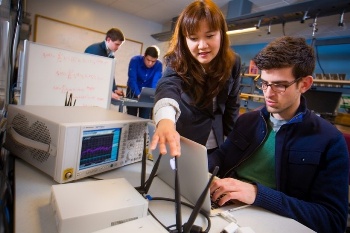May 9 2014
It's rush hour and every motorist on the highway is driving in the right lane. The center and left lanes are empty.
 UB engineers are using computers, transmitter/receivers and spectrum analyzers to develop "cognitive radio," a type of wireless communication that uses radio spectrum more efficiently. Photo: Douglas Levere
UB engineers are using computers, transmitter/receivers and spectrum analyzers to develop "cognitive radio," a type of wireless communication that uses radio spectrum more efficiently. Photo: Douglas Levere
The scenario, as ludicrous as it sounds, describes how most wireless communication systems work.
Thankfully, researchers are developing a way to undo the gridlock resulting from the proliferation of smartphones, laptops and other gadgets. It centers on the development of cognitive radio, a type of wireless communication that instantly finds and uses the best alternative channels.
The technology, while still under development, could make wireless communications 10 times faster. For example, it would take three minutes instead of 30 to download a movie.
“We’re not fully using the radio spectrum that’s allocated to wireless devices,” says Dimitris Pados, UB electrical engineering professor. “The system we’re developing eliminates those inefficiencies, allowing the transfer of as much information as possible while minimizing cross-interference.”
Pados is principal investigator of a four-year, $2.72 million grant awarded to UB by the U.S. Air Force Research Laboratory. Co-investigators are Professor Stella Batalama and associate professors Tommaso Melodia and Weifeng Su, all from UB’s Department of Electrical Engineering.
Wireless devices — everything from smartphones to sensors that monitor rows of soybeans — share an increasingly crowded radio spectrum. The congestion not only limits how fast information can be shared via wireless communication systems, it wastes energy, kicks people off the Internet and causes dropped cellphone calls.
The problem, however, isn’t necessarily a lack of radio spectrum. It’s how the spectrum is used.
Large bands of radio waves allocated to wireless devices often sit idle while other bands are crowded, according to the Federal Communications Commission and counterpart agencies worldwide. An example of this is AM radio, which in most locations in the United States is used less than FM radio. Cognitive radio promises to immediately identify unused channels throughout the radio spectrum and use them to share information.
“It’s like an air traffic control system where the maximum amount of planes are taking off and landing at each airport throughout the world,” Pados says.
The UB researchers will develop algorithms that optimize — as well as model and simulate — how the platform would work. Then, working with Rome, N.Y.-based ANDRO Computational Solutions, they will conduct actual tests of the technology using small unmanned aerial vehicles.
The grant will support four graduate students who will work as research assistants and four undergraduate researchers.
The researchers are members of the Signals, Communications and Networking Research Group in the Department of Electrical Engineering in the School of Engineering and Applied Sciences, which also includes professors Adly T. Fam and Mehrdad Soumekh; associate professors Michael Langberg and Leslie Ying; and assistant professors Nicholas Mastronarde, Gesualdo Scutari, Zhi Sun and Josep M. Jornet.
The group carries out research in wireless communications and networking, cognitive radios, extreme environment (i.e., underwater, underground) communications, secure communications, data hiding, information theory and coding, adaptive signal processing, compressed sensing, fault-tolerant data representation, multimedia systems, magnetic resonance imaging and image reconstruction, intra-body networks, big data, electromagnetic nanonetworks, network coding, large-scale optimization and machine learning.